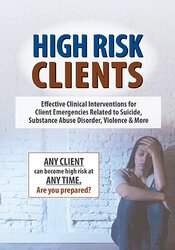

Join Paul Brasler, LCSW, as he navigates you through five of the most difficult scenarios in mental health today. Through real-life examples and live role plays, Paul will share the concrete strategies that he’s used over the last two decades to safely and effectively intervene in the challenging, urgent, and sometimes alarming situations that mental health professionals face. Full of practical tools and tips, this seminar will teach you to how to make crises situations more manageable, overcome your worries, and improve your readiness to handle mental health emergencies related to suicide, violence, substance abuse, trauma, and medical issues. Better still, instruction on professional liability management techniques, tips for documentation, and detailed reproducible assessment forms will have you feeling confident that you can focus on doing what’s best for your clients without fear of litigation. And, Paul’s guidance is applicable to your work regardless of your setting or clinical background.
Leave this seminar equipped to help your most vulnerable clients with the real-life skills and knowledge they don’t teach in graduate school!
Crises are never scheduled, convenient or easy. But they do happen and you will face them. Clients at risk for crisis often present with so many symptoms and issues, it’s hard to know where to start. Many clinicians, anxious about how to proceed, often miss or avoid asking the right questions to effectively intervene and keep clients (and themselves) safe.
As a clinician, have you ever felt:
Worried about the safety of your clients, even feared for their lives, but felt unprepared to handle the situation? Unsafe in the clinical environment, or unsure of how to handle situations where someone connected to your client might be in danger? Caught off guard when you’re wrapping up a session and a client discloses suicidal thoughts? Unsure if a client was using drugs, and ill equipped to identify the signs and symptoms of drug abuse? Concerned that you’re doing more harm than good for traumatized clients, despite your best intentions?
| File type | File name | Number of pages | |
|---|---|---|---|
| Manual (4.80 MB) | 80 Pages | Available after Purchase | |
| Manual: Module 1 - 6 Suicidal and High-Risk Clients - French (4.80 MB) | 80 Pages | Available after Purchase | |
| Manual: Module 1 - 6 Suicidal and High-Risk Clients - Italian (4.80 MB) | 80 Pages | Available after Purchase |

Paul Brasler, LCSW, CAIP, has been a licensed clinical social worker for over 20 years. He is the owner of Providence Consulting & Education, LLC, through which he provides clinical supervision and professional education services. Additionally, Paul provides Ketamine-Assisted Psychotherapy and other clinical services as part of a small practice. Paul has extensive experience in working with people in crisis and people living with substance use disorders, including adolescent residential treatment, community mental health settings, hospital emergency departments, Juvenile Drug Court, and private practice.
Paul has been a PESI national presenter since 2016, and he has presented classes across the country on Mental Health Emergencies, High Risk Clients, Resiliency, and a certification course for clinicians working with people with substance use disorders. He has written two books: The Clinician’s Guide to Substance Use Disorders: Practical Tools for Assessment, Treatment & Recovery (PESI Publishing, October 2022) and High-Risk Clients: Evidence-Based Assessment & Clinical Tools to Recognize and Effectively Respond to Mental Health Crises (PESI Publishing, 2019).
Paul has been a PESI national presenter since 2016, and he has presented classes across the country on mental health emergencies, high-risk clients, resiliency, and a certification course for clinicians working with people with substance use disorders. His second book, The Clinician’s Guide to Substance Use Disorders: Practical Tools for Assessment, Treatment & Recovery, PESI Publishing, was published in October 2022. Paul lives in Richmond, Virginia, with his beautiful wife, three sons, a cowardly dog, and two dwarf rabbits who are quietly plotting to destroy the world.
Speaker Disclosures:
Financial: Paul Brasler maintains a private practice and has employment relationships with LifeStance Health and Alchemy Wellness. He receives a speaking honorarium, recording, and book royalties from Psychotherapy Networker and PESI, Inc. He has no relevant financial relationships with ineligible organizations.
Non-financial: Paul Brasler has no relevant non-financial relationships.
|
High Risk Clients: Effective Clinical Interventions for Client Emergencies Related to Suicide, Substance Abuse Disorder, Violence & More
Copyright: 15/12/2022 - Product Code POS049335 |
Please wait ...